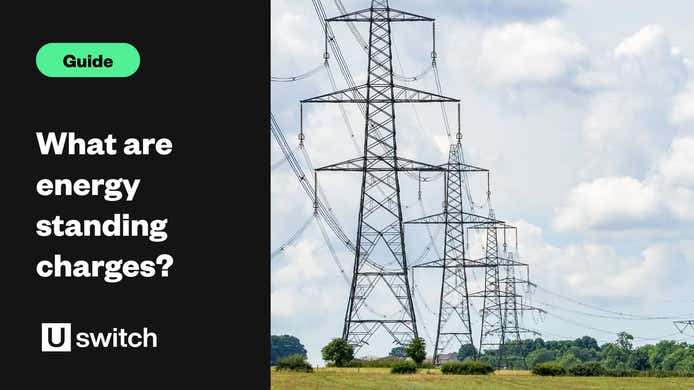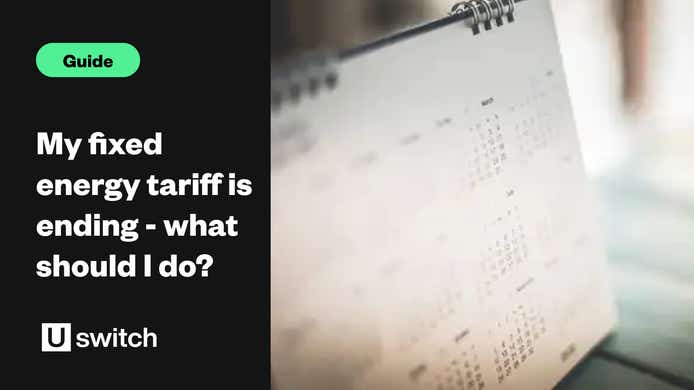What is a no standing charge electricity tariff?
A no standing charge tariff – also known as a zero standing charge tariff – is a gas, electricity or dual-fuel energy deal that doesn’t include standing charges.
A standing charge is a daily fixed fee that energy suppliers demand in addition to the rates charged for each unit of electricity and gas you consume. Zero standing charge tariffs only bill you for the energy you use. However, these tariffs typically charge higher unit rates for gas and electricity, which could result in higher energy bills.
Energy tariffs with no standing charge can be a good option for properties that use little gas and electricity, such as unoccupied residences and second homes. They’ve become increasingly beneficial in recent years as the daily standard charge cost has steadily risen, drawing criticism from those trying to manage their bills by using the minimum amount of energy.
How much are energy standing charges?
As of April until the end of June 2025, customers in the UK pay an average standing charge fee of 53.80p per day for electricity and 32.67p per day for gas.
| Electricity | Gas | |
|---|---|---|
| Unit rates | 27.03p per kWh | 6.99p per kWh |
| Standing charge | 53.80p per day | 32.67p per day |
The standing charges for the July price cap will be lower:
| Electricity | Gas | |
|---|---|---|
| Unit rates | 25.73p per kWh | 6.33p per kWh |
| Standing charge | 51.37p per day | 29.82p per day |
What makes no standing charge tariffs different to a normal tariff?
A zero standing charge tariff eliminates the set daily standing charge, so you only pay for the energy you use. Suppliers recover the fixed costs normally covered by the daily standing charge by increasing the rate you pay for each unit of gas and electricity you consume.
These contracts tend to employ a two-tier tariff. The first, higher tariff applies to the first few kilowatts of energy you consume, which helps pay the costs normally covered by the daily standing charge. The threshold for the higher tariff is typically 2kW. After that, the second tariff kicks in, reducing unit rates to a level similar to those seen with regular tariffs.
What’s the latest on no standing charge tariffs?
Widespread criticism of the rapid rise in standing charge costs led Ofgem to announce plans in December 2024 to ensure all suppliers will offer a zero standing charge tariff alongside their regular tariffs in the near future.
This should allow suppliers to increase their unit rates to cover the shortfall, and the aim is to give customers a greater choice of tariffs when they decide to switch energy supplier.
At the beginning of 2025, only three suppliers (E, Utilita and Ebico) offered zero standing charge tariffs. Ebico was forced to withdraw from the market after its supplier, Rebel Energy, ceased trading in early April 2025. However, this number is likely to increase by the end of the year as suppliers respond to Ofgem’s mandate.
What would more no standing charge tariffs mean for the price cap?
There’s a possibility that when suppliers are required to offer no standing energy charge tariffs, there will be an additional element added to the energy price cap.
Currently, there’s one cap for credit customers and another for prepayment customers. It’s likely that Ofgem will need to add a cap for tariffs with no standing charge to allow unit rates to be higher to compensate for the lack of standing charges, without making them prohibitively expensive.
Why should I get no standing charge electricity?
If you’re on a tariff that includes standing charges, you have to pay them regardless of whether you’re using any energy. For those who have properties that aren’t always occupied, this is an unwelcome cost.
If you switch to a zero standing charge electricity tariff, you only pay for the energy you use, which could make it a better option.
Low energy users
If you don’t use much gas and electricity in your home – perhaps you live alone, your home is well insulated or you generate some of your own electricity through solar panels, for example – you might benefit from a zero standing charge electricity or gas tariff.
Vacant or holiday homes
People with second homes that are largely left unoccupied are very likely to benefit from a no standing charge tariff because you only pay for the energy you use when the property is occupied.
People looking for flexible tariffs
A no standing charge tariff may also be an option if you want more flexibility in your tariff. Although zero standing charge tariffs increase the per-unit cost of energy, suppliers usually charge two rates: the first, higher rate applies to the first few kWh of energy you use, while a second, much lower rate applies to all energy used afterwards.
This means you aren’t charged for days when you use little or no gas or electricity, but aren’t penalised when you use more energy.
How much can you save with a no standing charge tariff?
This depends on the tariff you’re on and how much energy you use. If you regularly use little or no energy, switching to a no standing charge tariff could make sense as you eliminate the standing charges, which can cost as much as £16.68 a month for electricity and £10.13 for gas.
In theory, you could save over £310 on a typical dual-fuel bill over the course of a year, although the actual amount is likely to be less because at least some of those costs are recovered from the higher unit rates you’re charged.
To work out how much you might save from switching to a zero standing charge energy tariff, first get a recent energy bill.
- Look at your breakdown for the past 12 months – in particular, make a note of the amount of gas and/or electricity (in kWh) you’ve consumed
- Divide each figure by 365 to get an average daily amount
- Use the unit costs provided for the no standing charge tariff you’re thinking of switching to in order to calculate how much you’d pay each day on this tariff
- Multiply the results by 365
This should give you a figure that you can compare with your current tariff.
Who supplies no standing charge electricity?
As of June 2025, there are just two suppliers that offer no standing charge electricity (and gas) tariffs: E and Utilita. Both only work with prepayment meters, which limits your options.
In terms of the big six energy suppliers, none currently offers zero standing charge tariffs. But we expect to see new energy tariffs with no standing charges appear once Ofgem’s mandate comes into force later in the year.
Are there any disadvantages to electricity with no standing charge?
There’s a couple of disadvantages if you sign up to an electricity deal with zero standing charges:
- You don’t have as many choices in terms of the supplier, meter and type of plan you go for, which might not be ideal, depending on where you live.
- The fees you pay for the energy you use might end up being higher than those charged by other suppliers as they look to offset the money lost by not imposing a standing charge.
These disadvantages might not matter to you, but it’s worth considering the whole picture before committing to a no standing charge electricity or gas tariff.
Alternatives to no standing charge tariffs
You don’t need to seek out a low or no standing charge tariff to save money on your gas and electricity – there are other options. Zero standing charge tariffs currently only exist for prepayment customers and are geared very much towards those who use little electricity and gas.
Pay-as-you-go tariffs
It’s no longer the case that those on prepayment tariffs pay more for their energy than others. Since February 2024, those prepaying for their electricity and gas have paid slightly less for each unit of energy they consume compared to those using standard credit meters.
From 1 April 2025 to 30 June, prepayment customers pay 26.20p/kWh for electricity and 6.78p/kWh for gas in addition to the daily standing charge, which is the same as those with standard credit meters.
Find out more about how prepayment plans work with our guide to prepayment meters.
Fixed and variable tariffs
Those who pay for their energy in arrears, whether by standing order, Direct Debit or on receipt of a bill, enjoy the widest range of available tariffs. Standard variable tariffs are capped by the energy price cap, but you can also gain certainty over your bills by signing up for a fixed rate tariff.
Check out our guide to energy tariffs to compare these and other types, including tracker tariffs (which follow the wholesale price of energy) and time-of-use tariffs, such as Economy 7.
FAQs
Can I get no standing charge electricity with a prepayment meter?
Can I get business electricity with zero standing charge?
Zero standing charges are also available for business tariffs, and work in the same way as domestic tariffs that don’t include a standing charge. If you operate a seasonal business, such as a holiday park or a campsite, not having to pay a standing charge would be ideal.
However, like domestic energy tariffs, business energy tariffs with no standing charge are subject to higher unit rates, so calculate the impact on your bottom line when making your decision.
Is this part of a trend for new types of energy tariff?
It's likely that we'll see an increasing number of innovations in terms of available energy tariffs.
Energy use has changed and customers now have a greater understanding of how their energy habits and lifestyle influence their bills. Time-of-use tariffs, for example, are likely to become more popular, allowing people to take advantage of lower rates during off-peak hours.
Is it worth signing up to a no standing charge electricity tariff?
Ultimately, whether it’s worth signing up depends on your outgoings. Plus, whether you think it is more cost-effective to just pay the standing charge rather than potentially being subject to higher unit rates.
If you continuously live in the property, it doesn’t make sense to pay higher unit rates, because you’ll end up cancelling out the savings made by not paying the standing charge. If the property is a holiday home or a property you otherwise rent out infrequently, a tariff with no standing charges could well be the way to go.




